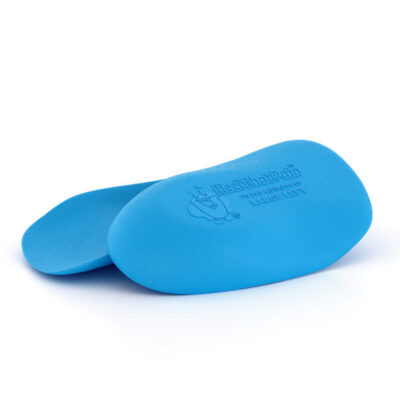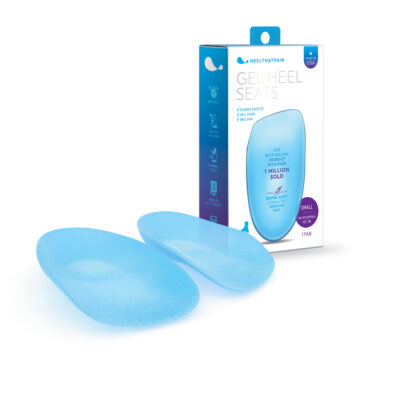The pain from plantar fasciitis is no joke. In fact, the condition can be so debilitating that walking feels all but impossible, especially first thing in the morning. When is it time to involve the help of a medical professional or foot doctor? What should you try before you seek medical attention for plantar fasciitis? What kind of doctor should you see?
Trying to determine the best course of action–especially when you’re in pain–can feel overwhelming to say the least. Keep reading to learn the answers to your questions about seeking help from a foot doctor.

Home Remedies You Can Try
Before you see a doctor, keep in mind that while the pain from plantar fasciitis can be severe, the condition often responds well to home remedies without medical intervention. Try a combination of the following home remedies. You might be surprised by how much they help!
Stretching: There are many simple stretches you can do right from the comfort of your own home. Stretching several times a day on an ongoing basis can strengthen your fascia and surrounding muscles and tendons, significantly speeding up the healing process. Try these easy stretches for plantar fasciitis.
Slip-in Orthotics: Cost-effective slip-in Heel Seats can provide immediate relief from the pain in your heels and fascia, allowing you to go about your daily activities by supporting and cushioning your fascia and heel.
Icing: Icing can greatly reduce the painful inflammation in your heels and fascia. Consistent icing, several times a day will provide the best results. It’s best to limit icing to 20 minutes at a time.
Dietary Changes: Weight and diet go hand in hand with plantar fasciitis. Click here to learn more about how weight and diet affect the health of your feet, and can be used to improve pain management.
When to See a Doctor
It’s important to see a doctor if you begin experiencing numbness in your feet or heels, fever along with the pain of plantar fasciitis, or if you start experiencing pain even when you’re not putting weight on the affected areas. You should also call a doctor if you’ve tried the home remedies above (along with a healthy dose of resting your feet and heels), and you haven’t seen improvement.
What Kind of Doctor for Plantar Fasciitis?
General Practitioner:
If you decide that seeing a doctor is the right move to treat your plantar fasciitis, your general practitioner is a great place to start. Because plantar fasciitis is a common ailment, most GPs are quite familiar with it and can be a great resource in coordinating with a specialist or determining additional treatment.
Sports Medicine Specialist
A sports medicine specialist is a great option for anyone whose plantar fasciitis is a result of a specialized activity, like running, soccer, or football. This specialist will not only be able to help you with additional treatment options, but he or she can help make specific recommendations as far as getting back into the swing of things in your training regiment.
Orthopedic Specialist
An orthopedic specialist may be able to offer valuable insight into treatment options, especially if your plantar fasciitis is severe or there are other underlying problems with your joints and tissues. While orthopedic specialists do spend much of their time dealing with foot related issues, they also specialize in dealing with the body’s joints and tissues at large.
Podiatric Specialist or Foot Doctor
Podiatric specialists deal specifically with the muscles, joints, tissues, and bones of the feet. They’re known as “foot doctors” for a reason! In severe cases, or in cases that do not respond to treatment, your general practitioner is likely to recommend you to a podiatry specialist.
Keep in mind that your insurance may require you to get preauthorization to see a specialist. Start by visiting with a trusted general practitioner. He or she will be able to make a good recommendation and put you in good hands. If at any point you feel rushed to make a decision, or feel like a particular course of treatment might not be for you because of the potential side effects and risks (surgery or steroids, for example), remember that you’re your own best advocate when it comes to your health. Do your own research, and don’t be afraid to ask for a second opinion!
While most cases of plantar fasciitis can be treated effectively and easily at home without medical intervention, knowing your options for medical treatment is important and can be a critical step toward healing. Carefully monitor your symptoms, try at-home remedies, and then seek medical help if symptoms don’t improve to get you back on your feet!
More Professional Treatment Options for Heel Pain





I’ve been seeing a specialist for my feet without gaining any relief. I have pain that shoots up th he outside of my heels at all times , off and on.
Hopefully you found a solution by now but I also have what you described. What worked for you?
It’s been 2 1/2 years I’ve had one doctor do tarsal tunnel surgery and 1 foot I’ve had to orthopedic surgeons tell me that there’s no arthritis in Either foot no tarsal tunnel and either foot either and he was going to do surgery on the other foot I do have plantar fasciitis and a bone that I was born with the sticks out of the back of my heel I was not told about that either . You know I am in the predicament of finding out if a podiatrist surgeon is better for me or the orthopedic surgeon doing my research and homework and that one before I go under the knife again
Meanwhile I have been to four podiatrist surgeons to orthopedic surgeons a vein doctor to make sure that the veins were not plug a nerve doctor neurologist and I’ve done all this homework myself to try to figure out what is going on because I cannot get a doctor to stick with me tell me exactly what is going on with me and fix my feet so it is been 2 1/2 years now when it should’ve been taken care within the first six months of the problem and I should be healed and back to work
Hi
what did you find?
Thanks
Megha
I feel like I am going through the same thing!! Did you ever get any answers?
I have pain after my shower in my arch. I have high arches if that matters.
I have been using Lidocane ointment which really does not help.b it.
I still have pain mid day and continues. It is in the ball of my foot, and can feel it
especially if I rub it.
My ankle was broken in that foot and the Dr checked the ball of my foot gave me exercises and nothing worked. Also he gave me an injection in my heel.
I would appreciate a Dr that could help me with NO surgery.
Thank you. I live in Marietta GA
my gp only wantedto give me pain killers but not happy with that, already taking pills for epilepsy
My whole long story was deleted accidentally.
Thank you for the advice,
Heel and ankle pain for over a year. Initially went to a podiatrist, got orthodics, a splint, and a boot to sleep in as well as stretching/icing routines. After several visits, the swelling went down. Ultrasound showed no signs of PF, just a little fluid in my foot and he said I should only come back as needed. Went to a physical therapist, still no signs of swelling, PF, etc. They suggested I see an internal medicine doctor. The internal medicine doctor has now referred me to an orthopedic. I can’t run, walking is extremely painful, and now the pain is not just in my arch/heel, but going up my ankle and feels like when I take a step my ankle will buckle under my weight.
Did you go see the Orthopedist? Have you healed at all? We’re in search for a solution to a very similar problem.
Amy, I know exactly how you feel. This is exactly my problem. I went to a podiatrist for 3 months and relief was very minimal for a short period of time. Now, back to severe pain and was never too satisfied with the podiatrist. She offered a treatment that was not cover by insurance before even trying some that are.
Now considering an orthopedic opinion. Did you visit one yet? Can you please share your experience with us? Thanks & hope you are feeling better.
For Plantar heel do we need to see a Orthopedic or Podiatric doctor?
Don’t visit Dr Douglas Pacaccio in Yorkville Illinois. He is a total hack butcher. He will slam all other Podiatrist’s and brag how rich he is and doesn’t need your money or business. He made me worse and I found out I was not the only one. SAVE YOURSELF SOME PAIN AND AVOID THIS GUY.
I have had a completely different experience with Dr Pacaccio. He was the first doctor out of 13 other physicians in the last 3 years to actually find and FIX my problem. I found him to be humble, honest, and compassionate. He came to me through a trusted referral of another nurse, whom he had also helped immensely.
As a nurse myself, I did an enormous amount of research prior to seeing him and found hundreds of positive reviews and very, very few complaints. He has spent over an hour with me and my husband at every appointment, one night staying nearly three hours with us. I felt no pressure from him to proceed and couldn’t be happier with the results thus far. I am currently less than 4 weeks post-op from my first tarsal tunnel release and have the other side being planned now. I have NONE of my pre-op symptoms in the surgical foot and it hasn’t even been a month yet. I have personally spoken with multiple other nurses whom have also used Dr. Pacaccio and all have been beyond satisfied. Nurses’ are extremely protective of our feet and their referrals and experiences were a vital part of my decision to use him. He is not even a provider employed by my employer but I still choose him.
If you have suffered as I did for the last three years with no answers, feel that no one can help, or feel that you need an experienced and compassionate surgeon, Dr. Pacaccio is the best choice you can make in my opinion.
I would encourage anyone I know to seek his help and feel divinely blessed to have found him.